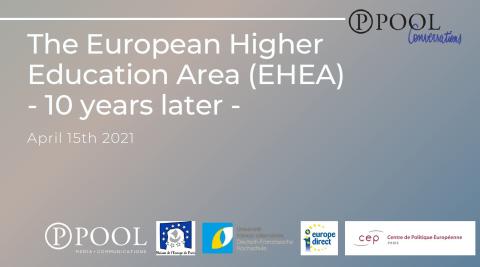
The European Higher Education Area (EHEA) – 10 years later
The construction of a European Higher Education Area (EAHEA) was formalized in Vienna in 2010. Also called The Bologna Process, this intergovernmental initiative launched in Bologna (Italy) in 1999 boosted far-reaching reforms with the goal of adopting common structures of higher education systems based on 3 cycles at the European level.
PROGRAMME:
Welcome by Michel Derdevet, President of Maison de l’Europe in Paris and by Pascal Jentsch, Managing director of PPOOL media & communications
Statement of Vanessa Debiais-Sainton, DG Education, Youth, Sport and Culture
Statement of Prof. Dr. Olivier Mentz, President of Franco-German University
ROUND TABLE 1 (2:15 pm – 4:00 pm)
REVIEW: What achievements have been made thanks to the Bologna
process? What pitfalls has to be to avoided, how to resolve weaknesses?
Moderator: Marie Pierre Gröndahl, Journal du Dimanche (JDD)
- Andrea Hofer, Labour Market Relevance and Outcomes of Higher Education, OECD, Paris
- Axel Honsdorf, BayFrance, Munich
- Robert J. Morrissey, University of Chicago
- Emilienne Baneth, Université PSL, Paris
- Alessandra Scagliarini, Università di Bologna
ROUND TABLE 2 (4:15 pm – 6:00 pm)
PERSPECTIVES: How to drive the EHEA forward? How to make progress visible for future students, for their parents and for international students and researchers?
Moderator: Matt Symonds, QS Quacquarelli Symonds & columnist at Forbes, BBC
- Cécile Blondel, Gobelins, L’école de l’image, Paris
- Rob Whitelam, City University of London
- Luca Lantero, BFUG Secretariat 2018-2020, Roma
- Eric Cassan, Université Paris-Saclay
- Patrick Lévy, Université Grenoble Alpes & European University Association
IN PARTNERSHIP WITH :
Maison de l’Europe de Paris, CEP France (Centre de politique européenne) and the support of Deutschfranzösische
Hochschule/Université franco-allemande
During the webinar do not hesitate to share your questions. The moderators will take your questions into account.
En ligne / onlineThe construction of a European Higher Education Area (EAHEA) was formalized in Vienna in 2010. Also called The Bologna Process, this intergovernmental initiative launched in Bologna (Italy) in 1999 boosted far-reaching reforms with the goal of adopting common structures of higher education systems based on 3 cycles at the European level.
PROGRAMME:
Welcome by Michel Derdevet, President of Maison de l’Europe in Paris and by Pascal Jentsch, Managing director of PPOOL media & communications
Statement of Vanessa Debiais-Sainton, DG Education, Youth, Sport and Culture
Statement of Prof. Dr. Olivier Mentz, President of Franco-German University
ROUND TABLE 1 (2:15 pm – 4:00 pm)
REVIEW: What achievements have been made thanks to the Bologna
process? What pitfalls has to be to avoided, how to resolve weaknesses?
Moderator: Marie Pierre Gröndahl, Journal du Dimanche (JDD)
- Andrea Hofer, Labour Market Relevance and Outcomes of Higher Education, OECD, Paris
- Axel Honsdorf, BayFrance, Munich
- Robert J. Morrissey, University of Chicago
- Emilienne Baneth, Université PSL, Paris
- Alessandra Scagliarini, Università di Bologna
ROUND TABLE 2 (4:15 pm – 6:00 pm)
PERSPECTIVES: How to drive the EHEA forward? How to make progress visible for future students, for their parents and for international students and researchers?
Moderator: Matt Symonds, QS Quacquarelli Symonds & columnist at Forbes, BBC
- Cécile Blondel, Gobelins, L’école de l’image, Paris
- Rob Whitelam, City University of London
- Luca Lantero, BFUG Secretariat 2018-2020, Roma
- Eric Cassan, Université Paris-Saclay
- Patrick Lévy, Université Grenoble Alpes & European University Association
IN PARTNERSHIP WITH :
Maison de l’Europe de Paris, CEP France (Centre de politique européenne) and the support of Deutschfranzösische
Hochschule/Université franco-allemande
During the webinar do not hesitate to share your questions. The moderators will take your questions into account.